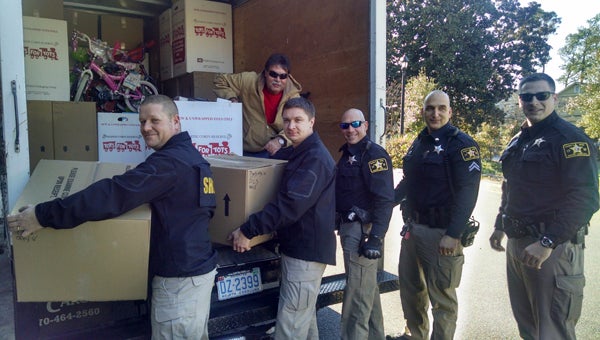PotashCorp donates a half-ton of toys for tots
Published 8:21 pm Tuesday, December 23, 2014

RICH MORIN | CONTRIBUTED
CHRISTMAS HAUL: John Robinson, PotashCorp organizer (top), and (left to right) Beaufort County Sheriff’s Office’s Investigator Jeremy Landek, Lt. Wesley Waters, Deputy Mike Lore, Deputy Joe Kolibabek and Deputy Jim Mills unload employee donations from a fully-loaded truck to Toys for Tots.
From PotashCorp-Aurora
Employees at PotashCorp (PCS Phosphate Company, Inc.) donated almost 1,000 pounds of toys in the annual Toys for Tots campaign. Along with toys of different shapes and sizes for kids of all ages, 16 bicycles were donated along with 53 boxes of toy-filled Christmas stockings donated by the company.
The gifts completely filled a 17-foot box truck and were unloaded by volunteers from the Beaufort County Sheriff’s Department, among others. The truck was donated by Cli-Co Storage in Washington.
The mission of the U. S. Marine Corps Reserve Toys for Tots Program is to collect and deliver new toys at Christmas as a message of hope to less fortunate youngsters to help them become responsible, productive, patriotic citizens.
“Toys for Tots serves so many in our area because of the generosity of PotashCorp’s employees,” said Rich Morin, a volunteer organizer. “It has been another terrific year for our county and area. A coordinated effort of Noon Rotaries of Belhaven and Washington, Beaufort/Hyde Partnership for Children and St. Peter’s Episcopal Church in Washington made it possible.”
John Robinson directed PotashCorp’s annual campaign with assistance from Andy Franklin and members of the Central Maintenance department. Helen Tyndall, a contract worker at the site, assisted employees and others by shopping for toys from cash contributions.
“We are excited to support Toys for Tots’ mission to share the joy of Christmas with underprivileged children in the region. These gifts will bring many smiles to faces. It is our privilege to continue this tradition of giving to children who face difficult circumstances,” said Ray McKeithan, PotashCorp’s manager of public affairs.
As the world’s largest crop nutrient company, PotashCorp plays an integral role in global food production. The company produces the three essential nutrients required to help farmers grow healthier, more abundant crops. With global population rising and diets improving in developing countries, crop nutrients such as potash, phosphates and nitrogen offer a responsible and practical solution to help produce the food we need, from the land we have.





